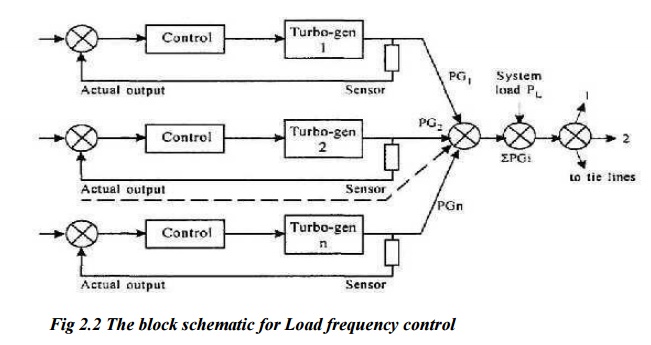Chapter: Power System Operation and Control : Real Power Frequency Control
Load Frequency Control
LOAD FREQUENCY CONTROL
The following basic requirements are
to be fulfilled for successful operation of the system:
1. The generation must be adequate to
meet all the load demand
2. The system frequency must be maintained
within narrow and rigid limits.
3. The system voltage profile must be
maintained within reasonable limits and
4. In case of interconnected operation,
the tie line power flows must be maintained at the specified values.
Ø
When
real power balance between generation and demand is achieved the frequency
specification is automatically satisfied.
Ø
Similarly,
with a balance between reactive power generation and demand, voltage profile is
also maintained within the prescribed limits.
Ø
Under
steady state conditions, the total real power generation in the system equals
the total MW demand plus real power losses.
Ø
Any
difference is immediately indicated by a change in speed or frequency.
Ø
Generators
are fitted with speed governors which will have varying characteristics: different
sensitivities, dead bands response times and droops.
They
adjust the input to match
the demand within
their limits.
Ø
Any
change in local demand within permissible limits is absorbed by generators in
the system in a random fashion.
Ø
An
independent aim of the automatic generation control is to reschedule the
generation changes to preselected machines in the system after the governors
have accommodated the load change in a random manner.
Ø
Thus,
additional or supplementary regulation devices are needed along with governors
for proper regulation.
Ø
The
control of generation in this manner is termed load-frequency control.
Ø
For
interconnected operation, the last of the four requirements mentioned earlier
is fulfilled by deriving an error signal from the deviations in the specified
tie-line power flows to the neighboring utilities and adding this signal to the
control signal of the load-frequency control system.
Ø
Should
the generation be not adequate to balance the load demand, it is imperative
Ø
that
one of the following alternatives be considered for keeping the system in
operating condition:
I. Starting fast peaking units.
2. Load shedding for unimportant loads, and
3. Generation rescheduling.
It is
apparent from the above that since the voltage specifications are not
stringent. Load frequency control is by far the most important in power system
control.

In order to understand the mechanism of
frequency control, consider a small step increase in load. The initial
distribution of the load increment is determined by the system impedance; and
the instantaneous relative generator rotor positions. The energy required to
supply the load increment is drawn from the kinetic energy of the rotating
machines. As a result, the system frequency drops. The distribution of load
during this period among the various machines is determined by the inertias of
the rotors of the generators partaking in the process. This problem is studied
in stability analysis of the system.
After the speed or frequency fall due to
reduction in stored energy in the rotors has taken place, the drop is sensed by
the governors and they divide the load increment between the machines as
determined by the droops of the respective governor characteristics.
Subsequently, secondary control restores the system frequency to its normal
value by readjusting the governor characteristics.
Related Topics